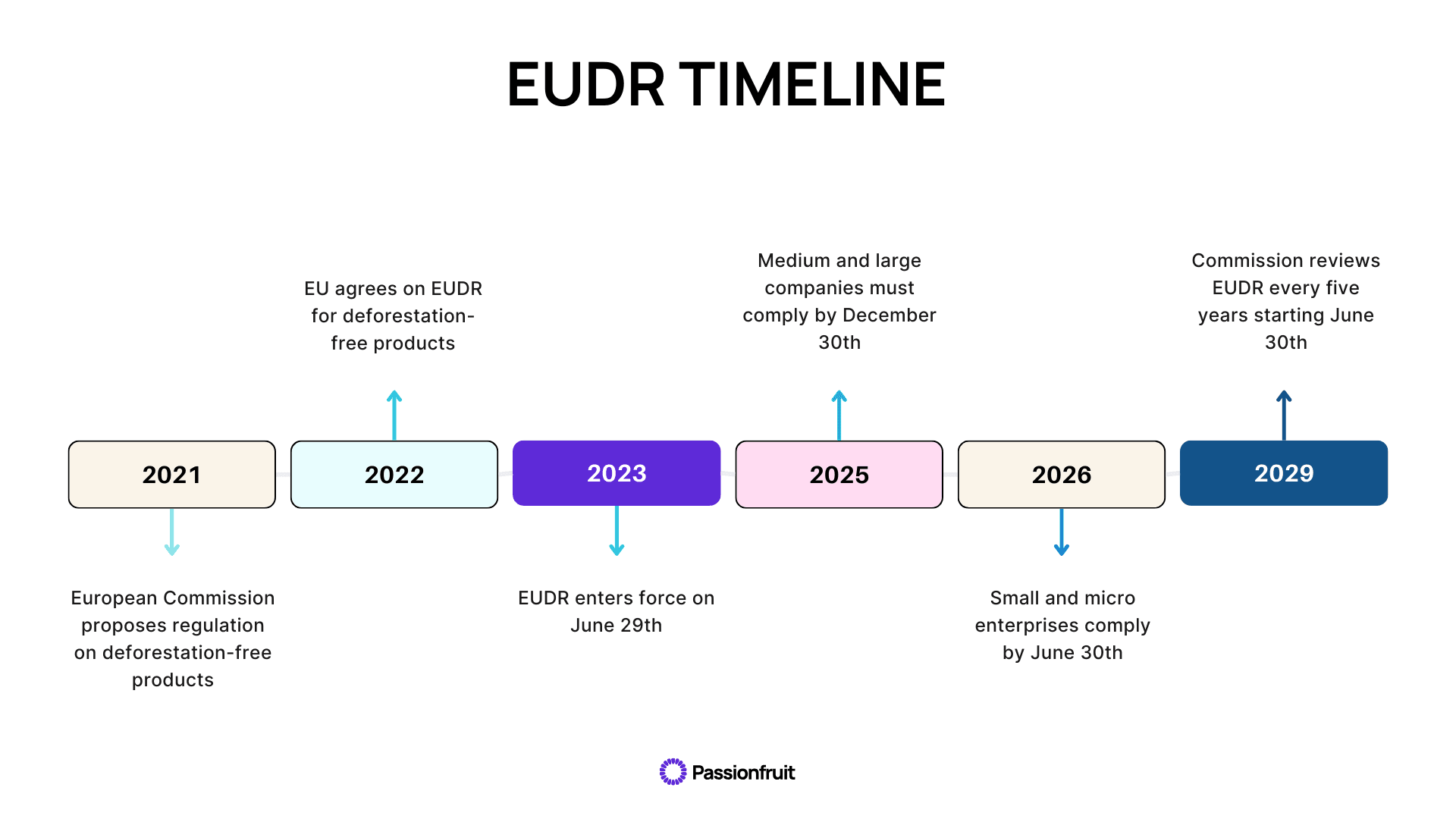Tuesday, December 10, 2024
Discover the essential steps food companies need to take to comply with the European Union Deforestation Regulation (EUDR).

Maikel Fontein
Dec 10, 2024
8
min
The European Union Deforestation Regulation (EUDR), enacted in 2023, represents a critical move toward tackling the global issue of deforestation linked to EU consumption. The regulation targets key commodities such as palm oil, cocoa, coffee, rubber, soy, and timber, which have long been associated with environmental degradation. By ensuring that products sold within the EU market are deforestation-free, the EUDR aims to curb the environmental impact of the EU and its trading partners.
For food industry businesses, this regulation presents a new challenge: ensuring that raw materials and processed products are sourced from sustainable, deforestation-free supply chains. While the full application of the EUDR was initially scheduled for December 2024, the timeline has been extended, providing businesses additional time to prepare. The new deadline allows companies to better align their processes with the regulation's stringent requirements. Companies now have until 30 December 2025 to comply, with smaller enterprises granted an additional year until 30 June 2026. This extension offers food companies crucial time to assess and adjust their supply chains to meet the deforestation-free standards required by the EU.
The New EUDR Timeline Phase
The European Union Deforestation Regulation (EUDR) timeline has been extended. Initially set to take full effect by 31 December 2024, the new deadlines are:
30 December 2025: Full application for large and medium-sized enterprises.
30 June 2026: Extended deadline for small and micro enterprises.
The delay was prompted by concerns from producers about the difficulty of meeting the regulation's stringent requirements within the original timeframe. The extension provides businesses with more time to implement traceability systems, conduct risk assessments, and ensure compliance.
While environmental groups have voiced concerns about the delay, the additional time allows companies to adapt while balancing environmental goals with the realities of global supply chains. This extension gives businesses a crucial opportunity to prepare for full compliance.

What is the European Union Deforestation Regulation (EUDR)?
The EUDR (Regulation (EU) 2023/1115) is a legislative framework designed to prevent the sale of commodities in the EU that are linked to deforestation or forest degradation. It applies to specific products that are derived from commodities such as palm oil, soy, cocoa, coffee, rubber, cattle, and timber. To meet the EUDR’s standards, these products must not be linked to deforestation or degradation that occurred after 31 December 2020.
For food companies, the EUDR mandates that products like chocolate (containing cocoa) or palm oil (used in various food items) must come from plantations and farms where the land has not been deforested after the cut-off date. This regulation applies to both raw materials and the processed food products made from them. For instance, food companies sourcing cocoa from Weuest Africa must verify that the cocoa farms they work with do not contribute to deforestation.
The regulation is part of the EU’s broader environmental agenda, including the European Green Deal and the Paris Agreement, aimed at reducing environmental footprints and promoting sustainable land use globally.
Key Features of the EUDR
1. Deforestation-Free Supply Chains
The primary requirement of the EUDR is that all products placed on the EU market must come from deforestation-free supply chains. This means companies must ensure that the land used to grow raw materials like palm oil, cocoa, and soy has not been deforested after 31 December 2020.
For food companies, this requirement means that their entire supply chain—whether they are importing palm oil or cocoa or sourcing processed products—must be traceable to farms and plantations that comply with the EUDR’s standards. To do so, companies will need to verify the origins of their products using tools like geolocation data and ensure that no illegal land clearance has occurred on the land used to grow the raw materials.
2. Due Diligence Requirements
Under the EUDR, companies must implement a due diligence system to ensure that the products they sell are sourced sustainably. This due diligence process involves:
Geolocation Data: Companies must collect detailed geographic data (latitude and longitude) for the plots of land where their commodities are grown. This data allows businesses to verify that the land used to produce raw materials has not been deforested after the cut-off date.
Risk Assessments: Operators must assess the risk of deforestation associated with their products. This could include evaluating the country of origin, deforestation rates, and governance in place to prevent illegal land clearance. For instance, sourcing palm oil from Indonesia—a country with high deforestation rates—requires a thorough assessment of the sustainability practices of the palm oil plantations.
Documentation and Certification: Companies must maintain records of their suppliers’ compliance with the EUDR, including certificates from recognized sustainability standards (Article 9). Third-party certifications like RSPO (Roundtable on Sustainable Palm Oil) or Fair Trade help businesses demonstrate that their products meet the regulation’s deforestation-free criteria.
3. Risk-Based Approach
The EUDR uses a risk-based approach to determine the level of scrutiny required for products from high-risk countries. For example, palm oil sourced from Southeast Asia—a region with a history of illegal land clearance—requires more detailed documentation and more frequent audits. In contrast, products sourced from countries with stringent environmental governance may face fewer checks.
This means food companies must assess the risks associated with their supply chains, particularly those sourcing from regions with high deforestation rates. The risk assessment should evaluate factors like land-use history and governance, helping businesses determine the level of due diligence needed.
4. Penalties for Non-Compliance
Failure to comply with the EUDR can result in significant penalties, including:
Fines for failing to meet the regulation's deforestation-free requirements can be up to 4% of the operator's or trader's total annual Union-wide turnover.
Product recalls if products found to be non-compliant are already in circulation.
These penalties underline the importance of ensuring compliance. Companies must take steps to build a robust due diligence system and maintain comprehensive records that prove the sustainability of their supply chains.
Compliance Steps and Practical Tips for Food Companies
1. Trace and Map the Supply Chain
To comply with the EUDR, food companies must map their entire supply chain for each relevant product. This means tracing raw materials like palm oil, cocoa, and soy back to the farms or plantations where they were grown. For compliance, companies need to collect geolocation data to confirm that the land used has not been deforested after 31 December 2020.
Leveraging technology like satellite monitoring helps track the exact location and history of the land used to produce their commodities, ensuring full transparency and traceability.
2. Conduct Detailed Risk Assessments
Food companies must conduct risk assessments to evaluate the likelihood that their products are linked to deforestation. This is particularly important for high-risk regions where deforestation rates are high or where governance is weak. For example, companies sourcing palm oil from Indonesia or cocoa from West Africa must assess the risk of deforestation associated with these regions and take steps to mitigate these risks by working with certified producers.
Regular audits, leveraging geospatial data, and integrating third-party assessments ensure that companies can track and verify whether their products are sourced sustainably.
3. Engage Third-Party Certifications
Working with certified suppliers simplifies compliance with the EUDR. Third-party certifications such as RSPO (Roundtable on Sustainable Palm Oil), Fair Trade, and Rainforest Alliance ensure that commodities meet deforestation-free standards.
Certification Bodies: Engaging with recognized certification bodies such as RSPO, Fair Trade, and Rainforest Alliance ensures that raw materials like palm oil and cocoa are sustainably sourced. These organizations set standards for deforestation-free production and audit suppliers to verify compliance.
Certification Management Software: These platforms help companies manage and track certifications across their supply chain. These tools allow food companies to verify that suppliers hold the correct certifications and meet the sustainability standards required by the EUDR.
4. Develop a Robust Due Diligence System
The EUDR requires food companies to implement a comprehensive due diligence system to ensure the products they sell are sourced sustainably. This system should facilitate the collection, verification, and storage of all relevant data related to the origin of raw materials and compliance with sustainability standards.
Supplier Portals: These digital platforms enable companies to collect and verify data from their suppliers. Suppliers can upload documentation, including geolocation data and certifications, which companies can then review and validate.
Document Management Systems: Effective document management systems allow businesses to store and track all due diligence-related documents, such as contracts, invoices, and audit reports. These systems should be accessible for internal audits and regulatory inspections.
Real-Time Monitoring Tools: Real-time monitoring platforms enable companies to track changes in the land-use practices of their suppliers. These tools alert businesses to potential violations of sustainability standards, allowing them to take immediate corrective action if needed.
Conclusion
The EUDR sets a new standard for environmental sustainability, requiring food companies to ensure that the products they sell in the EU do not contribute to deforestation. By implementing traceability systems, conducting thorough risk assessments, engaging with certified suppliers, and developing robust due diligence systems, companies can comply with the EUDR, mitigate the risk of penalties, and contribute to the EU’s broader sustainability goals.
With the extended timeline, companies now have additional time to adapt their operations, finalize compliance measures, and ensure full transparency in their supply chains. By leveraging advanced tools like geospatial mapping, satellite monitoring, blockchain, and third-party certifications, food companies can lead the way in ethical sourcing and create a positive environmental impact while meeting the EU’s regulatory standards.




